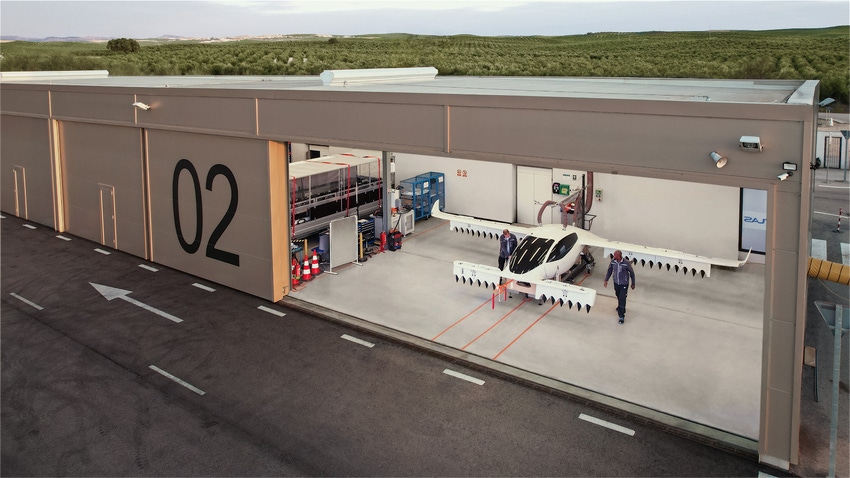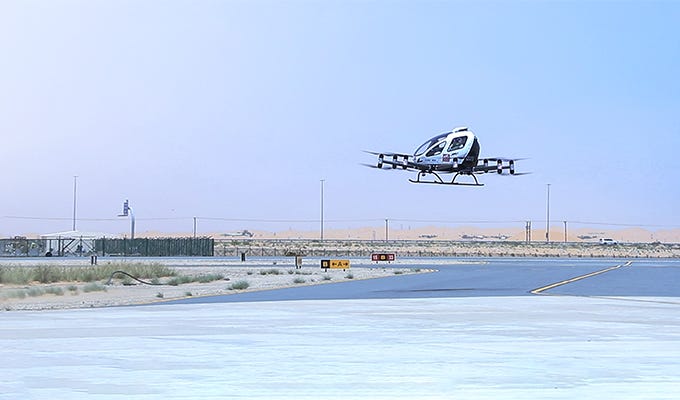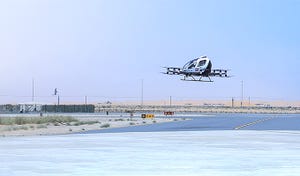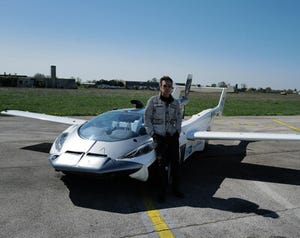Flying Taxi Company Starts Jet Production
In this next phase, the fuselage will be matched with the aircraft’s canards and main wings

The developer of an electric vertical takeoff and landing (eVTOL) company announced the start of production following the delivery of its first jet fuselage.
Lilium is now ramping up actual production shifting from the design to the production phase.
In this next phase, the fuselage will be matched with the aircraft’s canards and main wings.
The production is at Lilium’s facilities in Wessling, Germany.
“To see the first aircraft fuselage on the final assembly line ready to join up with the canard and wings is a proud moment for everyone involved in our mission to make aviation sustainable,” Klaus Roewe, CEO of Lilium. “We firmly believe the Lilium Jet will usher in a new era of sustainable regional mobility, offering the highest safety standards, as well as superior comfort, unit economics and customer experience.
Lilium has been growing in a number of areas.
For example, Lilium and Citic Offshore Helicopter Company (COHC) recently agreed for the two companies to collaborate to establish an electric aerial vehicle (EAV) operation network in China, starting with the Greater Bay Area.
Additional future services are planned for the Guangdong-Hong Kong-Macao Greater Bay Area, Hainan Island and Tianjin.
Lilium also recently announced a partnership with other suppliers in China, including Heli-Eastern and the Bao’an District of Shenzhen municipality.
In November, Lilium announced that ArcosJet DMCC plans to purchase 10 of its electric jets and become the exclusive dealer for its private jets in the Mideast.
Deliveries of the EAVs are expected to start in 2026 with the jets delivered to customers with a maintenance program, pilot training and two charging stations.
Lilium also has signed an agreement with Denso for technical assistance in optimizing production of the Lilium jet electric engine.
Denso specializes in powertrain electrification and plans to support Lilium in developing equipment and tooling for automation for high-volume production of jet engines and subsystems.
Lilium and Michelin recently partnered for the design, serial production and support of tires for the Lilium EAV.
The two companies started working together more than a year ago to develop and product custom tires for the electric jet.
Lilium started assembly of its electric propulsion system in September on a path to manned flights in 2024.
The Lilium eVTOL craft is a jet, unlike most EAVs.
The company intends for its seven-seater vehicles to be used as a regional air mobility service, connecting cities and towns 25 to 125 miles apart at speeds of up to 185 mph.
The aircraft features forward canards (small wings near the front) along with main wings and a distributed propulsion system with fixed landing gear without hydraulics.
During takeoff, the plane would use its 36 electric ducted fans to hover for up to 25 seconds and 20 seconds during the landing phase, according to the company. Most of the flight time would be in the cruise stage with a relatively short takeoff and landing time.
The company estimates the range of the craft at 150 miles upon entry into service in 2024.
The fuselage for the Lilium jet was developed by Aciturri in Spain, with delivery to Lilium facilities in Germany.
Aciturri, also a Lilium investor, has designed and manufactured airframe components for Airbus, Boeing and Embraer.
Lilium recently secured $192 million in financing in addition to a coming public offering. It received funding from different investors including board members and Tencent Holdings, one of its initial backers.
The company, founded in 2015, has manufacturing facilities in Munich, Germany, with teams in the U.S. and Europe.
The Federal Aviation Administration (FAA) recently issued Lilium a certificate validation of its Jet, having previously obtained airworthiness authority from the European Union Aviation Safety Agency.
Lilium is among a small number of companies seeking certification of its EAVs for both the U.S. and Europe.
The company is not alone in the race for new air transportation services, including flying cars, personal air vehicles, both ultralights, which do not require a pilot license, and certified, which require a license.
One eVTOL company, Joby Aviation, recently announced the planned building of a facility in Dayton, Ohio, to deliver up to 500 eVTOL vehicles a year.
The new manufacturing facility is the foundation for a planned aerial ride-sharing network.
Joby has partnerships with Uber and Delta Air Lines.
Like what you've read? For more stories like this on flying cars and emerging technologies, sign up for our free daily email newsletter to stay updated!
Read more about:
Flying CarsAbout the Author(s)
You May Also Like



.jpg?width=700&auto=webp&quality=80&disable=upscale)


.png?width=300&auto=webp&quality=80&disable=upscale)
.png?width=300&auto=webp&quality=80&disable=upscale)
